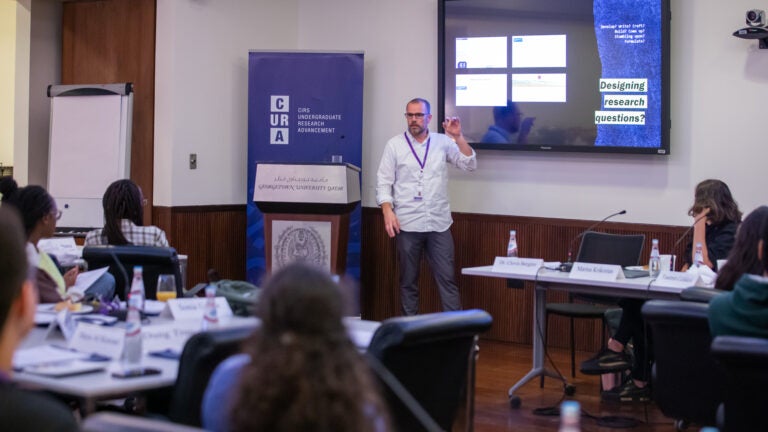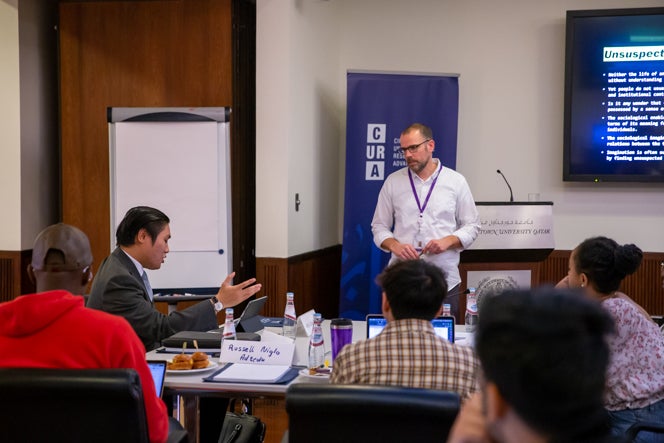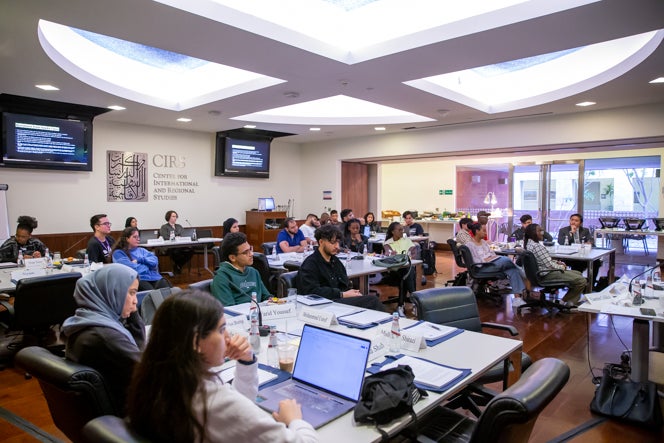Student Engagement
CURA Research Skills Workshop: Designing a Research Question

On February 9, 2023, the Center for International and Regional Studies (CIRS) hosted a research skills workshop titled “Designing a Research Question.” The workshop was presented in collaboration with the Institute for Advanced Study in the Global South (#IAS_NUQ) at Northwestern University in Qatar (NUQ), under the auspices of the CIRS Undergraduate Research Advancement (CURA) program. Twenty-three undergraduate students from GU-Q and NU-Q attended the workshop, which was led by Dr. Clovis Bergère, Assistant Director for Research at #IAS_NUQ.

“The biggest takeaway I had from this workshop is how to always include the biographical context in my research and how it goes a long way in helping me structure my questions.”
– Workshop participant
Bergère opened the workshop by posing a question about the idea of “designing” a research question. When talking about research questions, it is difficult to articulate exactly what one does to arrive at an effective research question – do you build, create, develop, write, craft, stumble upon? Bergère compared the process of arriving at a research question to that of cooking. You may be able to follow a recipe, but there is also a craft that two different chefs may bring to creating the dish that will result in two very different dishes, despite them being based on the same recipe. Similarly, Bergère stated that there is an element of recipe-following when devising a research question, but there is another less tangible element that can’t be captured in a “recipe.” It is this less tangible element that the workshop meant to address, and to give students the opportunity to work through the process with their peers.
As if following a recipe, a research question should be all the following: clear; focused; concise; complex; arguable; not too broad, not too narrow; not too easy to answer, not too difficult to answer; researchable; and analytical rather than descriptive. Bergère points out that while the above criteria seem straight-forward, it is difficult to find guidance on how to arrive at a research question with these criteria. Bergère shared excerpts from two books that have helped him to approach research: The Sociological Imagination, by C. Wright Mills (1959) and The Art of Listening, by Les Back (2007). Bergère explained that the prior book helps us to grasp history and biography and the relations between the two in society. The latter book shaped Bergère’s understanding of the work or the craft of research, and that it involves imagination. Bergère argues that both are needed in order to develop a research question that is meaningful to the researcher, and to others.
Taking this idea further, Bergère suggests three sorts of questions that can help researchers get to their question: what is the structure of this particular society as a whole?; Where does this society stand in human history?; and, What varieties of people now prevail in this society and in this period? Any of these three questions can be a starting point for thinking about a particular research topic and determining the perspective with which to approach it.
Finally, Bergère encouraged students to bring their personal experiences into the process and offered the frames of “troubles” and “issues” to relate their personal experiences to a research topic. Bergère explains that “troubles” occur within the character of the individual and within the range of their immediate relations with others. “Issues” then have to do with matters that transcend the local environment of the individual and the range of their inner life. With these two frames in mind, one can approach a research topic and begin the work of imagining a research question.
“…going forward I will think a lot about the historical and biographical” components of a research question.
– Workshop participant

The last half of the workshop was devoted to hands-on activities and group work. Students were asked to think of a research topic that was interesting to them. In the first activity, students described the topic, what brought them to the topic (their own “trouble” with it), and some key words about the topic. Students shared their work with their peers, and with feedback honed their ideas.
In the second activity, students used their imagination to write several questions related to the topic, considering the three types of questions Bergère suggested during the presentation. Students shared their questions, and also ordered them from broadest to narrowest. Working with their group, students provided feedback on their questions based on the criteria discussed at the beginning of the workshop. The workshop concluded with a reflection activity.
Article by Elizabeth Wanucha, CIRS Operations Manager